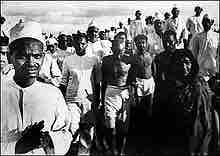Political dissent refers to any expression designed to convey dissatisfaction with or opposition to the policies of a governing body. Such expression may take forms from vocal disagreement to civil disobedience to the use of violence. Historically, repressive governments have sought to punish political dissent. The protection of freedoms that facilitate peaceful dissent has become a hallmark of free and open societies.
One form of political dissent is civil disobedience. Civil disobedience is the active, professed refusal to obey certain laws, demands, and commands of a government, or of an occupying international power. Civil disobedience is commonly, though not always, defined as being nonviolent resistance. It is one form of civil resistance. In one view (in India, known as ahimsa or satyagraha) it could be said that it is compassion in the form of respectful disagreement.
Civil disobedience can often take the form of direct action, which occurs when a group of people take an action which is intended to reveal an existing problem, highlight an alternative, or demonstrate a possible solution to a social issue. This can include nonviolent and less often violent activities which target persons, groups, or property deemed offensive to the direct action participants. Examples of direct action can include strikes, workplace occupations, sit-ins, tax resistance, graffiti, sabotage, hacktivism, property destruction, blockades, and other forms of community resistance.
Direct action stands in opposition to a number of other forms of disagreement, like electoral politics, diplomacy, negotiation, and arbitration, which are not usually described as direct action, as they are politically mediated. Non-violent actions are sometimes a form of civil disobedience, and may involve a degree of intentional law-breaking where persons place themselves in arrestable situations in order to make a political statement, but other actions (such as strikes) may not violate criminal law. The aim is to either obstruct another political agent or political organization from performing some practice to which the activists object; or to solve perceived problems which traditional societal institutions (governments, powerful churches or establishment trade unions) are not addressing to the satisfaction of the direct action participants.

Direct Action
Mohandas Gandhi and supporters Salt March on March 12, 1930. This was an act of non-violent direct action.
A common form of political dissent in terms of military service is conscientious objection. A conscientious objector (CO) is an "individual who has claimed the right to refuse to perform military service" on the grounds of freedom of thought, conscience, and/or religion. In general, conscientious objector status is only considered in the context of military conscription and is not applicable to volunteer military forces.